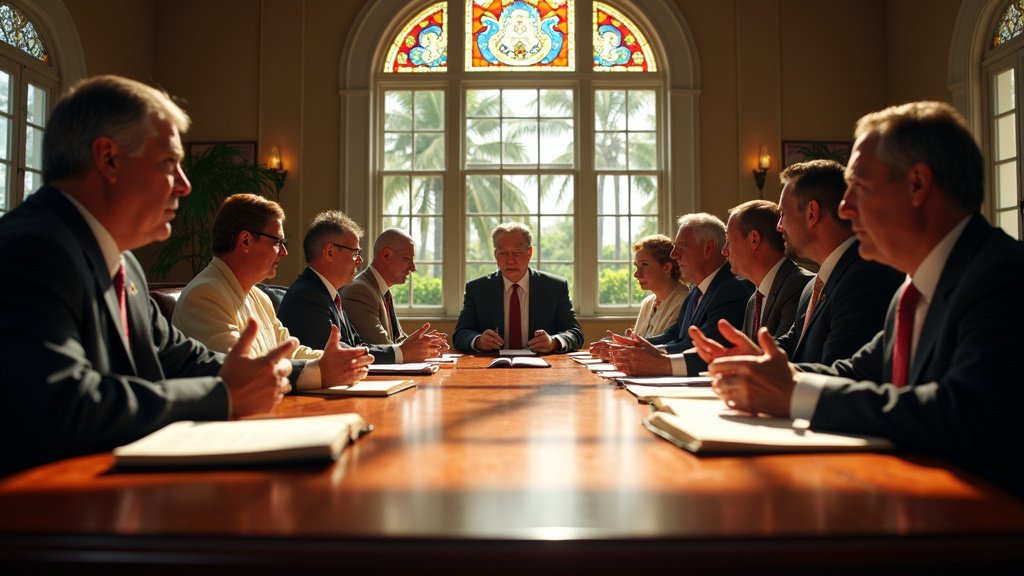IRS Policy Shift Sparks Debate Among Miami Faith Leaders
The Internal Revenue Service (IRS) recently issued a clarification that is set to reshape the relationship between religious organizations and the political arena. The new guidance, which is the focal point of this report, alters existing policy, allowing churches and other religious institutions to endorse political candidates. This significant change has immediately prompted a wave of reactions and discussions within the Miami faith community, with leaders from various denominations weighing in on the implications and potential impact of this updated IRS guidance.
Context of the Policy Change
The IRS’s move represents a notable departure from previous practices, which strictly prohibited tax-exempt organizations, including churches, from directly or indirectly participating in political campaigns. The earlier regulations, rooted in the separation of church and state, aimed to ensure that religious institutions maintained their non-profit status and did not become tools for political agendas. The recent clarification, therefore, signifies a shift that is likely to result in a significant increase in the political activities of religious organizations across the United States. It allows churches to more directly engage in political endorsement, which could lead to increased voter engagement and a re-shaping of the political landscape, particularly in areas where religious institutions have a strong presence.
Diverse Perspectives in Miami
Miami, a city known for its diverse population and vibrant religious community, offers a microcosm of the national discussion surrounding this policy change. The city’s numerous churches, representing a variety of denominations and theological viewpoints, are now grappling with the implications of the IRS clarification. The reactions range from enthusiastic support to cautious concern, highlighting the complexities of navigating the intersection of faith and politics.
One key area of discussion among religious leaders in Miami revolves around the potential for increased political involvement by churches. Proponents of the policy change argue that it allows religious organizations to more effectively advocate for their values and beliefs. They believe that churches have a moral obligation to engage in the political process and to support candidates who align with their religious principles. This perspective suggests that the IRS guidance will empower churches to become more vocal and influential in shaping public policy. They emphasize that faith should inform one’s political decisions and that churches can play a pivotal role in guiding their congregations in making informed choices during elections.
However, not all faith leaders share this view. Concerns have been raised regarding the potential for the policy to divide congregations and to blur the lines between religious and political institutions. Some fear that endorsing political candidates could alienate members of the church who hold opposing political views, leading to internal conflicts and decreased unity within the community. Moreover, there are concerns about the potential for churches to lose their non-profit status if they violate the new guidelines or engage in excessive political activity. The existing structure aims to prevent such occurrences, but the practical application of the guidelines requires careful deliberation and monitoring, especially given the wide range of political leanings and beliefs among congregations.
Implications for Upcoming Elections
The timing of this IRS clarification is particularly significant, given the upcoming elections. The policy change could have a noticeable impact on the electoral landscape, particularly in Miami and other regions with a high concentration of religious voters. Churches that choose to endorse candidates could mobilize their congregations and influence voter turnout, potentially shifting the balance of power in local and national elections.
The potential effects of this change are wide-ranging and include the possibility of increased political discourse within churches, more active involvement of religious leaders in political campaigns, and a greater emphasis on faith-based values in political debates. This could lead to a significant increase in voter participation among religious communities, thereby shaping the overall political landscape.
Navigating the Challenges
For Miami faith leaders, the challenge lies in navigating the complexities of this new landscape while remaining true to their religious values. This involves carefully considering the implications of the policy change, educating their congregations about the updated guidelines, and making informed decisions about their level of political engagement.
This balancing act requires a deep understanding of both religious doctrine and political realities. Faith leaders must strive to create an environment where open and respectful dialogue about political issues is encouraged, while also avoiding actions that could undermine the unity of their congregations or compromise their tax-exempt status. The ability to strike this balance will be crucial in determining the long-term impact of the IRS policy change on the Miami faith community and beyond.
Conclusion
The IRS clarification, allowing churches to endorse political candidates, marks a turning point in the relationship between religious institutions and the political sphere. In Miami, the reactions from faith leaders are varied, reflecting the city’s diverse religious landscape. The potential for increased political involvement, coupled with the upcoming elections, underscores the need for thoughtful consideration and careful navigation of the new guidelines. As the Miami faith community moves forward, its ability to balance its religious mission with its political engagement will shape the future of the city’s religious and political dynamics.





